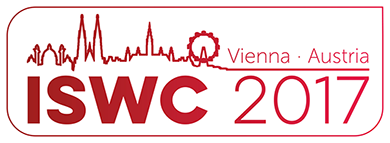Call for Research Track Papers
The International Semantic Web Conference is the premier venue for presenting fundamental research, innovative technology, and applications concerning semantics, data, and the Web.
In this track of ISWC 2017, we are looking for novel and significant research contributions addressing theoretical, analytical and empirical aspects of the Semantic Web. While we welcome work that relates to the W3C Semantic Web recommendations (e.g., RDF, OWL, SPARQL, etc.), we also encourage contributions to research at the intersection of Semantic Web and other scientific disciplines. Submissions to the research track should describe original, significant research on the Semantic Web, and are expected to provide some principled means of evaluation. Specifically, all papers should include evaluations of the approaches described in the paper. We strongly encourage evaluations that are repeatable. We also strongly encourage papers that provide links to: the data sets, source code, queries used to evaluate their approach, live deployment.
All papers will be assessed by a program committee. Each paper will be reviewed by at least four committee members, including one senior member. The review criteria used are outlined below.
Before submitting, authors are asked to consult the calls of the other tracks featured at ISWC 2017 and to choose the track that best suits their contribution. The submission of the same work to multiple tracks is not allowed and may result in a rejection of the work across all tracks without a review.
Topics of Interest
Topics of interest include, but are not limited to:
- Database, information retrieval, information extraction, natural language processing and artificial intelligence techniques for the Semantic Web
- Knowledge representation and reasoning on the Web
- Machine learning and data mining methods for the Semantic Web
- Data mining and knowledge discovery in Linked data and ontologies
- Management of Semantic Web data and Linked Data
- Robust and scalable management of semantics and data on the Web.
- Languages, tools, and methodologies for representing and managing semantics and data on the Web
- Architectures and algorithms for extreme volume, heterogeneity, dynamicity, and decentralization of Semantic Web data
- Cleaning, quality assurance, and provenance of Semantic Web data, services, and processes
- Ontology-based data access and integration/exchange on the Web
- Ontology engineering and ontology patterns for the Web
- Ontology modularity, mapping, merging, and alignment for the Web
- Search, query, integration, and analysis on the Semantic Web
- Supporting multi-linguality in the Semantic Web
- Information visualization and exploratory analysis methods for Semantic Web data
- Semantic social network mining, analysis, representation, and management
- Crowdsourcing semantics; methods, dynamics, and challenges
- Geospatial semantics and data on the Web
- Data streams and the Internet of Things
- Semantic technologies for mobile platforms
- Trust, privacy, and security on the Semantic Web
- Semantic Web and Linked Data for cloud environments
- Access Control and Privacy in Semantic Data
Reviews and Review Criteria
Papers in this track will be reviewed according to the following criteria:
- Originality
- Novelty
- Relevance and impact of the research contributions
- Soundness
- Design and execution of the evaluation of the work
- Clarity and quality of presentation
- Grounding in the literature
Authors will have the opportunity to submit a rebuttal to the reviews to clarify questions posed by program committee members.
Submission
- Pre-submission of abstracts is a strict requirement. All papers and abstracts have to be submitted electronically via EasyChair.
- All research submissions must be in English, and no longer than 16 pages (including references). Papers that exceed this limit will be rejected without review.
- Submissions must be either in PDF or in HTML, formatted in the style of the Springer Publications format for Lecture Notes in Computer Science (LNCS). For details on the LNCS style, see Springer’s Author Instructions. For HTML submission guidance, please see the HTML submission guide.
- ISWC 2017 submissions are not anonymous.
- We encourage embedding metadata in the PDF/HTML to provide a machine readable link from the paper to the resource.
- Authors of accepted papers will be required to provide semantic annotations for the abstract of their submission, which will be made available on the conference Web site. Details will be provided at the time of acceptance.
- We encourage authors to publish the resources related to their paper (research data, datasets, ontologies, software code and supporting documentation). Further instructions are given in the context of the resource track.
- Accepted papers will be distributed to conference attendees and also published by Springer in the printed conference proceedings, as part of the Lecture Notes in Computer Science series. At least one author of each accepted paper must register for the conference and present the paper there.
- Students will be able to apply for travel support to attend the conference. Preference will be given to students that are first authors on papers accepted to the main conference or the doctoral consortium, followed by those who are first authors on papers accepted to ISWC workshops and the Poster & Demo session.
Prior Publication And Multiple Submissions
ISWC 2017 will not accept research papers that, at the time of submission, are under review for or have already been published in or accepted for publication in a journal or another conference.
The conference organisers may share information on submissions with other venues to ensure that this rule is not violated.
| Important Dates | |
|---|---|
| Abstracts: | May 8th, 2017 |
| Full paper submission: | May 15th, 2017 |
| Author rebuttals: | June 23th – 27th, 2017 |
| Notifications: | July 14th, 2017 |
| Resource (data, software, …) snapshot submission due: | July 23, 2017 |
| Camera-ready versions: | July 28th, 2015 |
All deadlines are midnight Hawaii time.
Program Chairs
- Claudia d’Amato
University of Bari, Italy - Miriam Fernandez
Knowledge Media Institute, Open University, UK
Program Committee
The list of senior program committee and program committee members can be found here.

